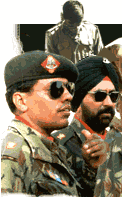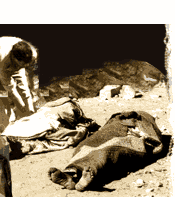|
|
|
|
|
| HOME | NEWS | INTERVIEW | |||
|
February 9, 2001
NEWSLINKS
|
The Rediff Interview/Colonel Ofi Reich, Israeli rescue team  
But the Israeli team stood out. And their temporary hospital at Bhuj -- an amazing, compact hospital capable of carrying out even high risk operations. Among its miraculous services was an incubator that was home to a 27-week old baby girl. The Israelis came with two missions: One to set up the hospital, and the other to carry out rescue operations. However due to delay in their study of the Indian response to the crisis.
What is the kind of logistics that your country has mobilised
for rescue and relief work in Kutch?
We arrived on January 29, with six aircraft, four of them C-130 and two
Boeings. All of them belong to the Israeli Army. We came here with the
intention of carrying out rescue and relief operations, and we had
everything including an entire mobile hospital.
We decided the hospital should be in Bhuj because the maximum destruction seems
to have taken place there. It started functioning on January 31.
There are about 60 patients there. And one of them is a 27-week old
newly born baby girl. She is in the incubator. We hope that she will be taken
to Mumbai.
What is your impression of the rescue work?
The (Indian) Army is terrific. Young officers from states such as Karnataka and
Punjab are working relentlessly here with so much energy amidst these
bodies. This is more brave than fighting a battle in Jammu & Kashmir.
What did you find lacking in the rescue operations here?
How can one think and say what you lack, when bodies are being pulled
out of everywhere. You have to analyse the shortcomings later. There are
various factors that need to be considered -- how people behaved immediately after
the accident, what climate was it, etc.
Fortunately it was neither summer nor monsoon. Then it would have been
worse, and rescue would not have been so easy.
Here you have an Army hospital in Bhuj, and hospitals almost in every
important area. You are doing whatever is possible.
Why did you bring a hospital? And not other things like food
and clothing?
We are trying to do whatever we can. You are already doing the best you
can. Our tent hospitals are highly sophisticated.
What has been Israel's experience with natural disasters?
In Israel we never did have any disasters like this. We have no floods.
Sometimes bombs kill a few. Also, we have only 6
million people, half of the population of Delhi. So, India's
enormous problems cannot be compared to that of Israel.
Design: Lynette Menezes
The Complete Coverage | List of earthquake sites
|
||
|
HOME |
NEWS |
CRICKET |
MONEY |
SPORTS |
MOVIES |
CHAT |
BROADBAND |
TRAVEL ASTROLOGY | NEWSLINKS | BOOK SHOP | MUSIC SHOP | GIFT SHOP | HOTEL BOOKINGS AIR/RAIL | WEDDING | ROMANCE | WEATHER | WOMEN | E-CARDS | SEARCH HOMEPAGES | FREE MESSENGER | FREE EMAIL | CONTESTS | FEEDBACK |
|||